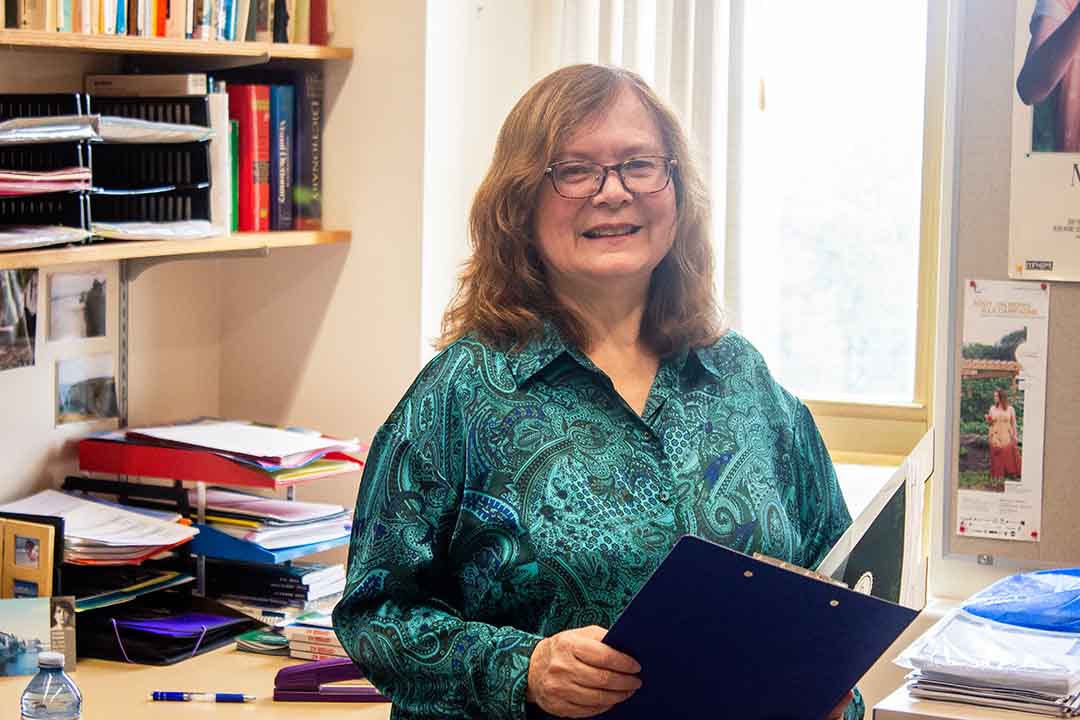
Creative writing conference offers new opportunities for Fransaskois authors
USask professor playing a key role in gathering French authors from across Western Canada
by Kristen McEwen
Professor Marie-Diane Clarke (PhD) is working to elevate Fransaskois creative writers in the province.
Clarke, who is the head of the Department of Languages, Literatures, and Cultural Studies at the University of Saskatchewan (USask), is a key organizer in an upcoming conference that will feature creative writing by French-speaking residents of Saskatchewan—also known as Fransaskois.
“My goal is to give Fransaskois writers more opportunities to present, be proud of, and publish their works,” she said.
Writers will be gathering on Oct. 5-6 to present excerpts from their works at the conference, “La Poésie fransaskoise sur les planches de la Troupe du Jour.”
The name of the conference translates to “Fransaskois Poetry on the Stage of La Troupe Du Jour,” though the event promises much more than poetry.
“In Saskatchewan, we have a tradition of Fransaskois playwriting by authors who often have performed on the stage of La Troupe du Jour, sometimes acting out scripts they wrote themselves, or who have had the opportunity to direct and produce plays in both French and English,” Clarke said.
The conference is being hosted at La Troupe Du Jour, which is the province’s only professional francophone theatre company. The theatre has produced many Fransaskois plays over the years from writers including Ian Nelson, Laurier Gareau, Madelein Blais-Dahlem, Raoul Granger, Gilles Poulin-Denis and Marie-Claire Marcotte.
Clarke noted that Fransaskois authors have not published as many poetry books compared to writers from other provinces, such as authors from the Franco-Manitoban community. Manitoba has the highest proportion of Francophones and French-speaking writers in Western Canada.
Publishing can be challenging for emerging Fransaskois writers when competing with established and experienced authors from other provinces, Clarke said.
“By inviting them to conferences, I want to give Fransaskois poets the opportunity to develop their talents or get more exposureand visibility in Saskatchewan and at the national level,” she said.
The weekend will celebrate Fransaskois and Métis authors, as well as 12 authors from Western Canada, including British Columbia, Alberta, Manitoba and Yukon.
The conference includes the launch of J.R. Léveillé’s La Poésie franco-ouestienne 1974-2024 (Éditions du Blé), the first anthology of poetry by contemporary Francophone authors from Western and Northwestern Canada. Clarke and three collaborators Eileen Lohka, Claudine Potvin and Amber O’Reilly contributed to the anthology.
Another book, Le Musée des objets perdus (Les Éditions de la nouvelle plume) by Lyne Gareau, will also be launched during the weekend.
The conference will feature poems, songs and excerpts from texts by Michel Clément, Thuy Nguyen, Jean Faustin Ningamo, Sébastien Rock, Hélène Ouédrago, Mamadou Bah, David Baudemont, Estelle Bonetto, Jérôme Melançon, Alasdair Rees among others. Authors will have their works presented by readers and actors, with some works completed and some still in progress.
Clarke will be debuting a new play, written about her late-brother who died in 2022. The play focuses on specific moments in her brother’s life—capturing more than just the ending.
Clarke organized the conference with her research group, Collectif d’ études partenariales de la Fransaskoisie (CEPF); in partnership with La Troupe Du Jour; and Fransaskois literary journal, À ciel ouvert; and financial support from Acfas Saskatchewan—one of six regional branches across Canada. The Saskatchewan branch includes a research group of Fransaskois scholars and academics from USask. Clarke is currently the CEPF secretary, part of the editorial committee for À ciel ouvert, and president of the Acfas Saskatchewan steering committee.
“I want to give more opportunities to the Fransaskois writers to meet and see what their peers are doing, and to share knowledge, writing concepts and techniques so that they are encouraged to do more and develop their art.”
Together, we will undertake the research the world needs. We invite you to join by supporting critical research at USask.


